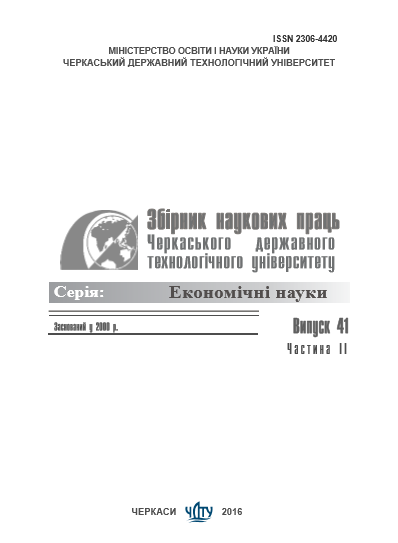SUBSTANTIATION OF IMPERATIVES OF THE GLOBAL FOOD PROBLEM SOLUTION
DOI:
https://doi.org/10.24025/2306-4420.2.41.2016.77991Ключові слова:
globalisation, global food problem, food support, imperative, imperatives of the global food problem solutionАнотація
The article substantiates imperatives of the global food problem solution as unconditional requirements for such fundamentals of the development of national and world agro-industrial complex, international trade and operation of the world food market able to provide the planet population with the sufficient quantity and respective quality of food products. A comprehensive research into various forms of the global food problem has determined the following imperatives of the global food problem solution: development of agricultural sector of national economies on innovation basis; poverty reduction and provision for accessibility of food products by maximizing the use of Official Development Assistance (ODA) resources; integration of agro-industrial complex manufacturers on the basis of establishment of national and international clusters that would produce certain food groups; diversification of quantitative and qualitative international trade components, food market stability and limitation of excessive food price volatility; improvement of living standards in rural areas by means of decentralisation of financial resources for the benefit of local communities; environmental friendliness of the global agri-food complex development, implementation of new technologies on the Green Economy paradigm basis.
Посилання
Bilorus, O.G., Honcharenko, M.O., Lukianenko, D.G & Zlenko, V.A. (2001). Globalization and Development Security. Kyiv: Kyiv National Economic University, 733 p. (in Ukr.).
Braudel, Fernand (2006). Material civilization, economy, and capitalism, ХV – XVІІІ centuries. Translated from French by Kubbel, L.E.; foreword by Afanasieva, Iu.N., 2nd edition, Moscow: Ves mir (in Russ.).
Berezin, O.V. & Berezina, L.M. (2011). Correlation between socio-economic security and food security in the process of building relations of agricultural enterprises, Ekonomika APK, 7, pp. 104-109 (in Ukr.).
Vlasov, V.I., Sabluk, V.P. & Lysak, M.A. (2009). Methodological approaches to the assessment of country’s food security. Ekonomika APK, 8, pp. 43-45 (in Ukr.).
Malthus, T.R. (1998) An Essay on the Principle of Population. Kyiv: Osnovy, 535 p. (in Ukr.).
Sen, A. (1981). Poverty and Famines: An Essay on Entitlement and Deprivation. Clarendon Press, Oxford.
Hall, B. (2014). Understanding food security data and methodology. Hunger Issue Brief March 2014. Waltham MA: Food Security Institute, Center of Hunger and Poverty: Brandeis University.
Buianova, M. E. & Medvedev, S. I. (2015). Non-Economic Aspects of the Public Development Phenomenon. Available from: <http://www.volsu.ru/s_conf/tez_htm/008.htm> [Accessed 19 April 2016]. (in Russ.).
Kalchenko, T. V. (2007).Imperatives of Systemic Interaction in Global Economy Formation. Published summary of the thesis for the degree of the Doctor of Science (Economics) within speciality 08.00.02 – World Economy and International Economic Relations. Kyiv, 32 p. (in Ukr.)
Medvedkin, T. S. (2013). Imperatives of International Knowledge Transfer in the System of Global Scientific and Technological Transformations. Published summary of the thesis for the degree of the Doctor of Science (Economics) within speciality 08.00.02 – World Economy and International Economic Relations. Donetsk, p. 43. (in Ukr.)
Meshko, N. P. (2008). Innovation Development of the World Economy Countries in the Globalisation Context: Monograph. Donetsk: South East, p. 46. (in Ukr.)
Poroshenko, O. Imperative Method in Legal Relation Regulation. Available from: <http://fb.ru/article/129045/imperativnyiy-metod-v-regulirovanii-pravovyih-otnosheniy> [Accessed 7 April 2016]. (in Russ.)
Immanuel Kant.Groundwork of the Metaphysic of Morals [works in six volumes]. M.: Mysl, (V. 4.), (Part I.), p. 211-310. (in Russ.)
Ukrainian Language Dictionary: in Eleven Volumes. (1973).Volume 4, p. 20. (in Ukr.)
Randall Kempner. Regional development: imperatives in an innovative economy. Available from: <http://www.prosperitystrategies.com/papers/people_based_ED.pdf. > [Accessed 25 April 2016]
World Economic Forum Ponders “Creative Imperative” By George Dwyer Washington, DC 25 January 2006. Available from: http://www.voanews.com/english/archive/2006-01/200-01-25-voa60.cfm?CFID=98509012&CFTOKEN=57469251&jsessionid=883094ad5548ecfb53473147535f2b427f7e> [Accessed 7 April 2016]
Kariel, H. G. (1997). Land Use in Alberta’s Foothill. Western Geography, 7, pp. 20-46.
Landabaso, M. (2012). Research and innovation Strategies for Smart Specialization. European Commission, DG REGIO, Thematic Coordination and Innovation, 38 p.
Bulatova, O. V. (2012).Regional Component of Global Integration Processes: Monograph. Donetsk: Donetsk National University, 386 p. (in Ukr.)
##submission.downloads##
Номер
Розділ
Ліцензія
Авторське право (c) 2019 Nadia Volodymyrivna Stezhko

Ця робота ліцензується відповідно до Creative Commons Attribution-NonCommercial 4.0 International License.
Автори, які публікуються у цьому журналі, погоджуються з наступними умовами:
Автори залишають за собою право на авторство своєї роботи та передають журналу право першої публікації цієї роботи на умовах ліцензії Creative Commons Attribution License, котра дозволяє іншим особам вільно розповсюджувати опубліковану роботу з обов'язковим посиланням на авторів оригінальної роботи та першу публікацію роботи у цьому журналі.
Автори мають право укладати самостійні додаткові угоди щодо неексклюзивного розповсюдження роботи у тому вигляді, в якому вона була опублікована цим журналом (наприклад, розміщувати роботу в електронному сховищі установи або публікувати у складі монографії), за умови збереження посилання на першу публікацію роботи у цьому журналі.
Політика журналу дозволяє і заохочує розміщення авторами в мережі Інтернет (наприклад, у сховищах установ або на особистих веб-сайтах) рукопису роботи, як до подання цього рукопису до редакції, так і під час його редакційного опрацювання, оскільки це сприяє виникненню продуктивної наукової дискусії та позитивно позначається на оперативності та динаміці цитування опублікованої роботи (див. The Effect of Open Access).

